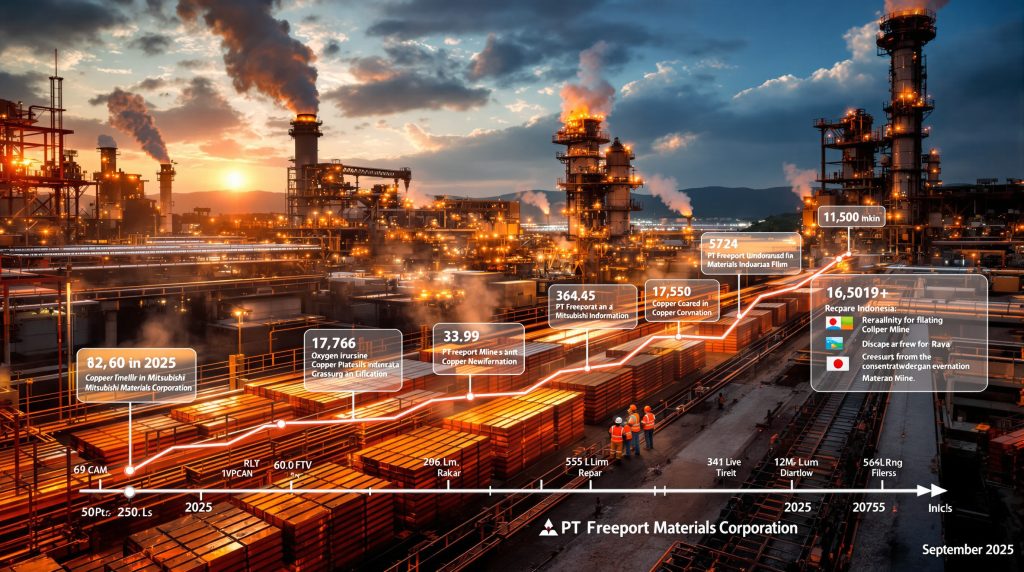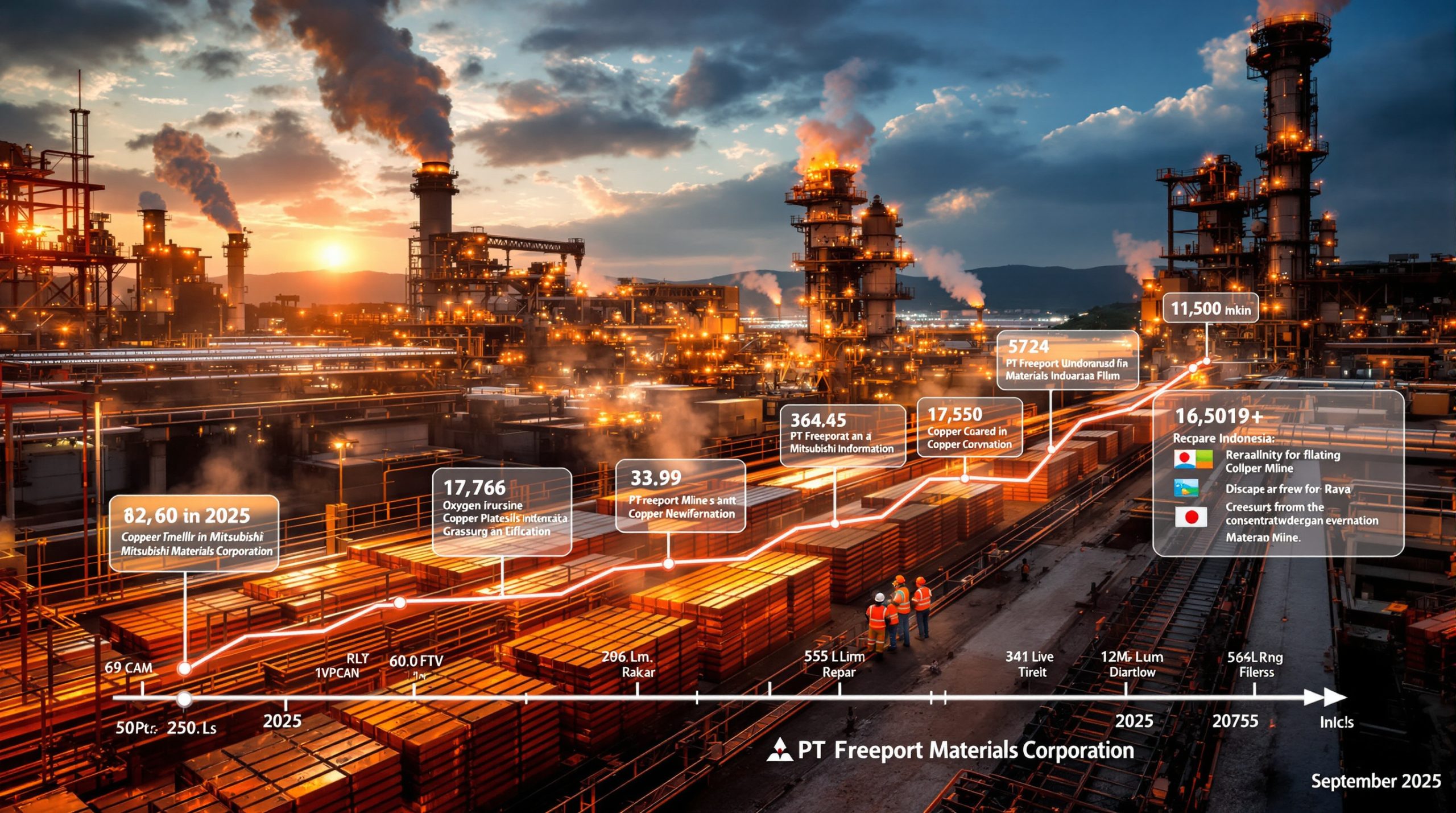What is Happening at Freeport Indonesia's Gresik Smelter?
The long-anticipated repair work at PT Freeport Indonesia's joint-venture smelter in East Java is reaching its final stages, with completion expected by early September 2025. Engineers are primarily focusing on fixing the facility's oxygen plant, which has been the main factor delaying the smelter's restart operations. The maintenance process has been ongoing for approximately one month, representing a critical phase in Indonesia's broader strategy to enhance domestic mineral beneficiation.
Oxygen plants play a vital role in copper smelting operations by providing the necessary oxygen enrichment for efficient metallurgical processes. Without properly functioning oxygen systems, the entire smelting process becomes compromised, highlighting the technical complexity involved in maintaining such sophisticated processing infrastructure.
Facility Specifications and Capacity
The Gresik smelter operates as a strategic partnership between PT Freeport Indonesia and Japan's Mitsubishi Materials Corporation, showcasing international collaboration in Indonesia's resource processing sector. With an annual production capacity of 342,000 metric tons of copper cathode, the facility stands as a cornerstone of the country's downstream metal processing infrastructure.
This processing capacity is particularly significant as the facility handles approximately 40% of Freeport's copper concentrate output from its world-class Grasberg mine complex. This integration creates a vital production chain from mine to refined metal, aligning with Indonesia's goal of capturing more value from its mineral resources.
How Do These Repairs Impact Copper Supply Chains?
The temporary shutdown of the Gresik smelter has introduced a notable disruption in regional copper supply dynamics. With a facility capable of producing 342,000 metric tons of copper cathode annually being offline for maintenance, the short-term effect has been a reduction in Indonesia's copper cathode output available to domestic and regional markets.
This temporary production gap has created localized supply tightness, particularly in Asian markets that rely on Indonesian copper cathode. Buyers who typically source from this facility have been forced to seek alternative suppliers or adjust their procurement timelines, creating ripple effects throughout regional supply chains.
Global Copper Market Effects
Despite these regional impacts, the global copper market has shown resilience to the Gresik facility's temporary closure. The relatively short maintenance timeline, combined with advance notice to market participants, has allowed for appropriate adjustments in global trade flows. Major copper consumers have implemented contingency sourcing strategies, mitigating potential price volatility.
Meanwhile, Freeport Indonesia has been able to continue its copper concentrate export activities under a special permit arrangement with the Indonesian government. This flexibility has helped maintain some supply continuity during the maintenance period, though the situation highlights the delicate balance between domestic processing requirements and export activities.
What is Indonesia's Copper Processing Strategy?
Indonesia's approach to copper and other mineral resources represents a significant shift in national resource management policy. The country implemented a comprehensive ban on copper concentrate exports in mid-2023, signaling a decisive move toward requiring in-country processing and value addition rather than simply exporting raw materials.
However, recognizing the transition challenges for major producers, the government granted Freeport a special permit to continue copper concentrate shipments until September 16, 2025. This pragmatic approach has allowed the company to maintain operational continuity while developing domestic processing capacity. By mid-August 2025, Freeport had already exported approximately 65% of its allocated 1.27 million ton concentrate quota under this arrangement.
Domestic Processing Capacity Expansion
The resumption of operations at Freeport's Manyar smelter in May 2025, with copper cathode production beginning in July 2025, represents another important milestone in Indonesia's processing capacity development. The Manyar facility complements the longer-established Gresik operation, demonstrating Indonesia's commitment to building a robust domestic processing ecosystem.
This multi-facility approach reflects Indonesia's strategic vision of establishing itself as a significant player in global mineral processing rather than merely serving as a source of raw materials. The policy framework aims to create additional employment, technology transfer, and economic value within the country's borders.
Why is the Gresik Facility Strategically Important?
The Gresik smelter holds particular strategic significance within Indonesia's mineral processing ecosystem. As a facility that processes approximately 40% of output from one of the world's largest copper mines, it represents a crucial link in the country's value-addition chain for mineral resources.
The joint venture structure with Japan's Mitsubishi Materials Corporation also highlights the importance of international technical expertise and capital in developing sophisticated processing infrastructure. This partnership model combines Indonesia's resource advantage with international metallurgical expertise, creating a sustainable operational framework.
Relationship to Grasberg Operations
The Gresik facility's strategic importance is further magnified by its relationship to Freeport's Grasberg mining complex. By processing a significant portion of Grasberg's copper concentrate output, the smelter enables an integrated production chain from extraction to refined metal. This vertical integration helps optimize logistics and creates operational synergies that benefit both mining and processing operations.
The facility also helps balance export and domestic processing requirements during Indonesia's transition toward full in-country processing. This flexibility is particularly important as the country works to develop sufficient processing capacity to handle its substantial mineral production volumes.
What Are the Broader Implications for Indonesia's Mining Sector?
The ongoing maintenance at the Gresik smelter illuminates several important aspects of Indonesia's evolving approach to resource nationalism. The practical challenges of implementing and maintaining sophisticated processing infrastructure highlight the technical complexity involved in transitioning from a raw material exporter to a processor of finished products.
The temporary nature of the shutdown, combined with the government's flexible approach to export permitting during the transition period, demonstrates a pragmatic implementation of resource nationalism policies. This balanced approach recognizes industry realities while maintaining progress toward strategic national objectives.
Investment and Operational Considerations
The maintenance requirements at Gresik underscore the ongoing capital investment needed to maintain reliable processing infrastructure. Beyond the initial construction costs, sophisticated metallurgical facilities require regular maintenance and occasional major overhauls to maintain operational efficiency and safety standards.
The joint venture structure between Freeport Indonesia and Mitsubishi Materials Corporation offers a model for international cooperation in developing and maintaining such facilities. This partnership approach allows for risk sharing, technology transfer, and operational expertise exchange, potentially offering a template for future copper investment insights.
How Does This Compare to Regional Copper Processing Developments?
Indonesia's strategic focus on developing domestic copper processing capacity positions the country as an emerging hub in the Asian copper processing landscape. While established processing centers in Japan, China, and South Korea have historically dominated regional refining activities, Indonesia's policy-driven approach is creating a new competitive dynamic.
The country's strategic advantage lies in proximity to its own world-class copper resources, particularly the Grasberg complex. This geographical advantage reduces logistics costs and complexity compared to shipping concentrate to distant processing facilities. However, developing the technical expertise and operational reliability to match established processing centers remains an ongoing challenge.
Global Processing Capacity Trends
Indonesia's approach mirrors a broader global trend among mineral-rich nations seeking to capture more value from their resources through domestic processing. Countries across Africa, Latin America, and Asia have implemented or considered similar policies requiring in-country processing of minerals before export.
However, establishing new smelting and refining capacity presents significant technical and capital challenges. The sophisticated nature of modern metallurgical facilities requires substantial investment, specialized expertise, and rigorous operational standards. The maintenance requirements at Gresik demonstrate that even established facilities require ongoing attention and investment to maintain reliable operations.
What Should Stakeholders Monitor Going Forward?
Several critical timeline milestones will shape the future landscape for Freeport Indonesia's operations and the broader Indonesian copper sector. The expected completion of oxygen plant repairs at Gresik by early September 2025 represents the most immediate milestone, with stakeholders watching closely for any delays or complications in the restart process.
Perhaps more significantly, the September 16, 2025 expiration of Freeport's special export permit for copper concentrate represents a crucial regulatory deadline. The government's decision regarding potential extensions or modifications to this permit will provide important signals about Indonesia's continued implementation of its resource nationalism policies.
Market Indicators to Watch
Market participants should monitor several key indicators to gauge the impact of the Gresik restart and broader Indonesian copper policy developments. Copper cathode production volumes following the repairs will provide insight into the facility's operational stability and efficiency post-maintenance.
Regional copper price premiums and discounts will indicate how the market is responding to the restored processing capacity. Meanwhile, concentrate export volumes through the remaining permit period will show how Freeport is balancing domestic processing and export activities ahead of the permit expiration. Understanding current copper price insights will be crucial for stakeholders in this evolving landscape.
FAQ: Freeport Indonesia's Copper Processing Operations
What caused the delay at the Gresik smelter?
The primary cause of the delay in restarting the Gresik smelter has been identified as issues with the facility's oxygen plant. Oxygen plants are critical components in copper smelting operations, providing the necessary oxygen enrichment for efficient metallurgical processes. The specific technical issues with the oxygen plant components required specialized repairs that extended the maintenance period to approximately one month.
How does the Gresik facility compare to the Manyar smelter?
While both facilities process copper concentrate from Freeport's operations, they represent different phases of Indonesia's processing capacity development. The Gresik facility is a long-established joint venture with Mitsubishi Materials Corporation with annual capacity of 342,000 metric tons of copper cathode. The Manyar smelter, which resumed operations in May 2025 and began producing copper cathode in July 2025, represents newer processing capacity that complements the Gresik operation within Indonesia's broader processing ecosystem.
What happens after September 16 when the export permit expires?
After the special export permit expires on September 16, 2025, Freeport Indonesia will face a regulatory transition point. The company will need to either process all its copper concentrate domestically or secure another extension of its export authorization. The government's decision will likely depend on the operational status of domestic processing facilities, including both Gresik and Manyar, and their combined capacity to handle Grasberg's production volumes. The policy direction taken at this juncture will signal Indonesia's continued approach to balancing domestic processing requirements with operational realities.
How do these developments affect global copper markets?
The temporary reduction in processing capacity at Gresik has had limited global impact due to the relatively short timeline for repairs and advance notice to market participants. The scheduled nature of the maintenance allowed buyers to implement alternative sourcing strategies, preventing significant market disruptions. However, the situation demonstrates the ongoing challenges in maintaining consistent copper supply forecast and highlights Indonesia's growing importance in global copper processing.
Strategic Significance of Indonesia's Copper Processing Infrastructure
The ongoing repairs at Freeport Indonesia's Gresik smelter illustrate the technical challenges involved in maintaining sophisticated mineral processing infrastructure. As Indonesia continues implementing its resource nationalism policies, the balance between domestic processing requirements and export flexibility remains crucial for operational stability and market continuity.
The expected completion of repairs by early September 2025 will restore significant copper cathode production capacity, supporting both national policy objectives and global supply chains. This maintenance period, while temporary, highlights the complex interplay between technical operations, regulatory frameworks, and international market dynamics in the evolving landscape of global copper production.
For industry stakeholders, the situation at Gresik provides important insights into the practical implementation of Indonesia's mineral processing strategy. The government's pragmatic approach, allowing continued exports during the development of domestic processing capacity, demonstrates a balanced implementation of resource nationalism principles that acknowledges industry realities while advancing strategic national interests.
As the September 16, 2025 deadline for Freeport's special export permit approaches, market participants will be watching closely for signals about Indonesia's continued policy direction. The decisions made at this juncture will not only impact Freeport's operations but also provide important indications about Indonesia's longer-term approach to balancing domestic processing requirements with the operational realities of its mining sector. In a related development, the upcoming Chile copper smelter shutdown in 2025 could create additional ripple effects in global copper markets.
Ready to Spot the Next Major Mining Discovery?
Don't miss another transformative ASX mineral announcement—explore Discovery Alert's proprietary Discovery IQ model that delivers real-time alerts on significant mineral discoveries, turning complex geological data into actionable investment insights. Visit the Discovery Alert discoveries page to understand why historic discoveries like De Grey Mining have generated substantial returns for early investors.




